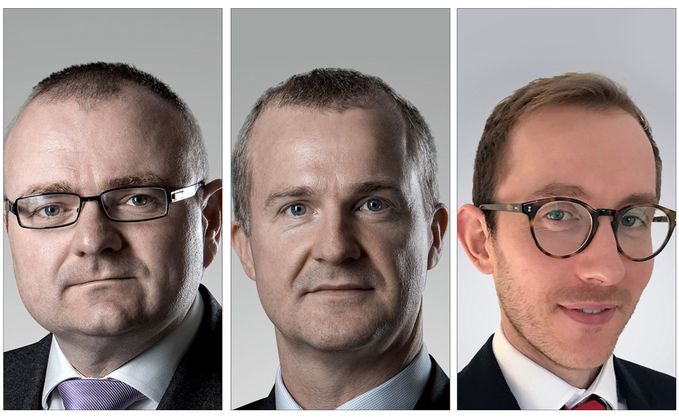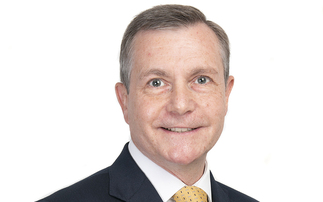
Left to right: Iain Buckle, Rory Sandilands and Ritchie Thomson
In December 2022 Professional Pensions held a webinar in association with Aegon Asset Management to discuss net zero in fixed income.
The webinar panel - which comprised Aegon Asset Management head of credit UK Iain Buckle, fixed income investment manager Rory Sandilands and responsible investment specialist Ritchie Thomson - looked at the frameworks and approaches fixed income investors are taking when incorporating climate change in their portfolios.
The panel, chaired by Professional Pensions editor Jonathan Stapleton, also talked about how short-dated bonds can help meet climate objectives while delivering outcomes for investors.
Listen to the webinar in full here.
Why is climate change an increasingly important theme within fixed income and how can we incorporate it within portfolios?
Iain Buckle: Significant action is required to reduce our greenhouse gas (GHG) emissions throughout the world. We expect the scrutiny by regulators and underlying pension scheme members of climate-related exposures to only increase. From an investment perspective, companies most poorly aligned with that transition will gradually underperform those better aligned. How do we go about determining whether a company is well aligned with the transition to net zero? Over the last 12 months we have been working with our responsible investing team to build a forward-looking framework that will evaluate a company's alignment with the transition to net zero.

What does that process look like? Every company gets a base assessment of its climate-transition readiness by looking at three things: any ambitions or targets with regard to GHG emission reductions, their current level of GHG emissions, and overall management policies towards climate transition. Then we categorise every company using a 1-5 scale from leaders to laggards - respectively those that are ready for a low-carbon future and those that are not. This can be used across different asset classes but so far we have implemented this analysis into a global short-dated investment grade bond portfolio.
Why is now a good time to invest specifically in short-dated investment grade bonds?
Rory Sandilands: 2022 saw a significant move higher in base rates around the globe, as central banks sought to tame inflation and bring it under control. This is reflected in the dramatic shift higher in yields.
Turning more specifically to the opportunity in credit, incremental yield remains available in high-quality investment grade bonds compared to underlying risk-free assets. Credit spreads increased over this period - reflecting both the increase in underlying interest rate volatility we have seen in 2022, and the deteriorating economic outlook and its potential for the impact on company balance sheets.
While such risks warrant close monitoring, investment grade credit fundamentals are in relatively good shape and we expect companies to be able to manage their balance sheets and liquidity appropriately.
What in your view makes a company's transition plan credible?
Ritchie Thomson: Most companies are at relatively early stages of transition planning. We have seen more companies now beginning to make commitments to emission reduction targets. Although transition plans need to go well beyond emission reduction targets, they also act as a good first step to assess whether the plan itself is robust and credible. The plan can only really be credible if the target itself is ambitious enough.
On the target-setting piece of the strategy, what we first like to see from a credibility perspective is long-term commitment to net zero, but also robust targets set, more in the short to medium term. It is important that we see deep reductions in emissions over the next decade if we are to meet the goals of the Paris Agreement.
Are there any unique considerations for fixed income investors when integrating climate change into portfolios?
Iain Buckle: Investment grade fixed income is dominated by financial companies. Although they typically have very low carbon footprints, they obviously play a very important role in financing sectors that may be exposed to climate risks. Understanding the financials and what they are doing regarding climate change is very important for fixed income. That is why we include the major financial sectors in our high-influence sectors.
Data quality in investment grade is pretty good, but as you get down into other parts of fixed income, such as high yield and emerging markets, it starts to be less reliable. It is not like listed equity, where the level of disclosure is always very high.
Engagement can also be a challenge as a bond investor, and we need to look closely at how we engage with companies on climate transition matters. We would very much like to be in a position whereby we can engage direct from the portfolio if that makes sense on companies that rate poorly. We would like to develop that into more of a two-way conversation around asking them to provide the direction of the business and us being able to perhaps criticise on areas where we find shortcomings.
Looking at specific emissions and scope 1, 2, 3 emissions, how do you think about those in your portfolio?
Ritchie Thomson: We look at scope 1 and 2 emissions for every issuer, essentially to check they are included within the base assessments, where we look at target setting and emissions performance. With Scope 3 emissions, which are far broader, things become more dispersed when it comes to coverage. Where scope 3 emissions are the key issue for a company in terms of materiality and that issue can reduce those emissions, we focus on scope 3 emissions as the key issue there. We then take a deep dive in terms of the targets. Have they set scope 3 targets and are they looking at the right thing? Is strategy aligned to those scope 3 targets?
What is your outlook for fixed income risks?
Rory Sandilands: We see two key risks - inflation, and a potentially much deeper recession.
With respect to the inflation picture, if higher inflation does transpire from here and persist, it will force central banks to raise rates further beyond current market pricing. A modest rise, around the 4.5% in the UK base rate, would not necessarily be challenging. However, something much more significant would certainly challenge the thesis of how constructive we are around the front end of the market.
With the recessionary outlook, we anticipate a marked downturn next year, but not perhaps something to really threaten the investment grade space. We are not overly concerned about recession risks from an investment grade perspective, largely because most companies are in a pretty robust place going into this period.
While we are keenly monitoring these risks, our view remains constructive on this part of the market for 2023.
This webinar was held on 6 December 2022 in association with Aegon Asset Management. Listen to the discussion in full here.
Disclosures
This material is provided by Aegon Asset Management (Aegon AM) as general information and is intended exclusively for institutional, qualified, and wholesale investors, as well as professional clients (as defined by local laws and regulation) and other Aegon AM stakeholders.
This document is for informational purposes only in connection with the marketing and advertising of products and services, and is not investment research, advice or a recommendation. It shall not constitute an offer to sell or the solicitation to buy any investment nor shall any offer of products or services be made to any person in any jurisdiction where unlawful or unauthorized. Any opinions, estimates, or forecasts expressed are the current views of the author(s) at the time of publication and are subject to change without notice. The research taken into account in this document may or may not have been used for or be consistent with all Aegon AM investment strategies. It has not been prepared in accordance with any legal requirements designed to promote the independence of investment research and may have been acted upon by Aegon AM and Aegon AM staff for their own purposes.
This document contains "forward-looking statements" which are based on Aegon AM's beliefs, as well as on a number of assumptions concerning future events, based on information currently available. These statements involve certain risks, uncertainties and assumptions which are difficult to predict. Consequently, such statements cannot be guarantees of future outcomes.
The following Aegon affiliates are collectively referred to herein as Aegon Asset Management: Aegon USA Investment Management, LLC (Aegon AM US), Aegon USA Realty Advisors, LLC (Aegon RA), Aegon Asset Management UK plc (Aegon AM UK), and Aegon Investment Management B.V. (Aegon AM NL). Each of these Aegon Asset Management entities is a wholly owned subsidiary of Aegon N.V. In addition, the following wholly or partially owned affiliates may also conduct certain business activities under the Aegon Asset Management brand: Aegon Asset Management (Asia) Limited (Aegon AM Asia), Aegon Private Fund Management (Shanghai) Co. Ltd.
Aegon AM UK is authorised and regulated by the Financial Conduct Authority (FRN: 144267) and is additionally a registered investment adviser with the United States (US) Securities and Exchange Commission (SEC). Aegon AM US and Aegon RA are both US SEC registered investment advisers. Aegon AM NL is registered with the Netherlands Authority for the Financial Markets as a licensed fund management company and on the basis of its fund management license is also authorized to provide individual portfolio management and advisory services in certain jurisdictions. Aegon AM NL has also entered into a participating affiliate arrangement with Aegon AM US. Aegon AM Asia is regulated in Hong Kong by the Securities and Futures Commission of Hong Kong for Professional Investors only (under SFC Ordinance Cap 571); in China, Aegon Private Fund Management (Shanghai) Co., Ltd is regulated by the China Securities Regulatory Commission (CSRC) and the Asset Management Association of China (AMAC) for Qualified Investors only; In Taiwan Neither Aegon Asset Management nor any of its affiliates are registered and may not sell, issue, or offer any products or services while in Taiwan. Marketing is intended to Professional Investors only has not been reviewed or endorsed by any regulatory authority in Taiwan; In Korea, Aegon USA Investment Management (AUIM) is registered as a CB-DIM and delegates Aegon Asset Management (Asia) Ltd to provide marketing and client services in Korea. Intended for Qualified Professional Investors only and contents have not been reviewed or endorsed by any regulatory authority in Korea; In Japan, neither Aegon Asset Management nor any of its affiliates carry on investment business. Intended for accredited, expert or institutional investors only and contents have not been reviewed by the Financial Services Agency of Japan.
©2022 Aegon Asset Management or its affiliates. All rights reserved.







